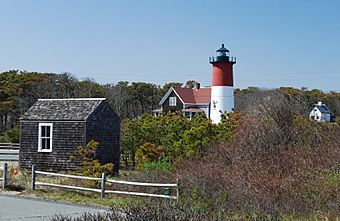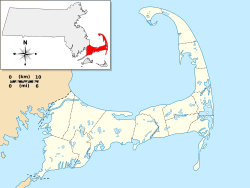French Cable Hut facts for kids
Quick facts for kids |
|
|
French Cable Hut
|
|

Relocated French Cable Hut, near Nauset Light
|
|
| Nearest city | North Eastham, Massachusetts |
|---|---|
| Built | 1891 |
| Architect | French Cable Company |
| Architectural style | Colonial |
| NRHP reference No. | 76000153 |
| Added to NRHP | April 22, 1976 |
The French Cable Hut is a historic building found in the Cape Cod National Seashore in Eastham, Massachusetts. Built in 1891, this small hut was a key connection point for a huge underwater cable. This cable, owned by the French Cable Company, helped send messages across the Atlantic Ocean.
The cable came ashore near the hut. From there, it connected to the company's main office in Orleans. After the cable was no longer used in 1932, the hut was changed into a house. Later, the National Park Service fixed it up to look just like it did when it was first built. This special building was added to the National Register of Historic Places in 1976.
What Does the French Cable Hut Look Like?
The cable hut is a small, one-story building made of wood. It has a pointed roof and measures about 10 by 15 feet (3 by 4.5 meters). Its outside walls are covered with wooden shingles, and it has simple white trim around the edges.
There is a door on one end of the building. A single window is on one of its side walls. The building was carefully restored between 1998 and 2000. It was also moved about 200 feet (60 meters) away from the ocean's edge. This was done because the shoreline was eroding, meaning the land was wearing away. The hut is now placed near the Nauset Beach Light, which was also moved in the 1990s to protect it.
How the Cable Hut Helped Connect the World
The very first French-owned underwater cable was laid in 1869. It stretched all the way from Brest, France to Duxbury, Massachusetts. An American company later bought this cable in 1873.
A new company, the French Cable Company, was started. In 1879, they laid a second cable to Eastham. This cable came through Saint Pierre and Miquelon, which are islands near Canada. The company first had a small office near the shore in Eastham.
To help their workers, the company built a bigger office in Orleans. This building is now a museum called the French Cable Station. The small hut we see today replaced the original Eastham office. It was where the huge transatlantic cable joined another cable. This second cable ran along Nauset Beach and through Town Cove to the Orleans office.
The Hut's Journey Through Time
The cable was used until World War II. It was stopped in 1940 when France surrendered during the war. The hut was then left empty. In 1946, the town sold the cabin because of unpaid taxes. The new owners added more rooms to the hut, making it about 20 by 26 feet (6 by 8 meters).
The original part of the hut, which was just an empty space, became a living room. Bedrooms and a kitchen were added on. This building was rented out as a vacation home until 1972. That's when the National Park Service bought it. They made it part of the Cape Cod National Seashore. The park service used it to house employees who worked there during certain seasons.
In 1986, the hut was very close to the edge of the bluff above Nauset Beach. In 1998, the building was moved back from the edge. It was also restored to its original look, and the extra rooms added in the mid-20th century were removed.
The French Cable Hut was even featured on a TV show! It appeared in an episode of the PBS series History Detectives. The show talked about a 19th-century transatlantic telegraph cable, which is exactly what the hut was for.


